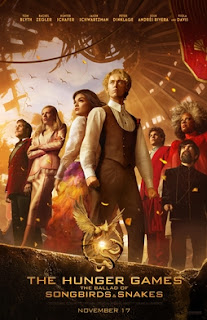The Hunger Games: The Ballad of Songbirds & Snakes

The Hunger Games: The Ballad of Songbirds & Snakes
Starring Tom Blyth, Rachel Zegler, Viola Davis, Peter Dinklage
Directed by Francis Lawrence
Coriolanus Snow (Tom Blyth) lives in the Capitol where he's selected to serve as one of the twenty-four students assigned to mentor contestants for the tenth annual Hunger Games. His contestant is Lucy Gray Baird (Rachel Zegler), a singer from District 12 who charms the people with her singing and her tenacity. He approaches Dr. Gaul (Viola Davis) - the head gamemaker of the Hunger Games - and suggests that they do things different this time around, and get people more involved in watching the Games before they're canceled. He uses this opportunity to get closer to Lucy Gray and train her to win, against the wishes of the author of the Hunger Games, Casca Highbottom (Peter Dinklage), who wants the mentors to train the contestants to just be spectators. He breaks the rules and draws attention to Lucy Gray with the public who gather together to watch the Hunger Games program, where he watches as Lucy Gray endures the trials in hopes she makes it through alive.
The Good:
The film is split into three chapters, and the first chapter is known as "The Mentor." This chapter introduces the Hunger Games and, more importantly, Coriolanus Snow. It's interesting to tell a prequel story about a future villain and making him into a hero who then turns into a villain, and it isn't too often that happens. Relative newcomer Tom Blyth slips on the shoes belonging to Donald Sutherland with ease, however, and gives the younger Coriolanus a certain charm and charisma that shows how he became the future President of Panem. He doesn't care about breaking the rules for his tribute as long as it leads to her winning and, more importantly at first, him earning the Plinth Prize scholarship. Yet as he forms a relationship with Lucy Gray, his intentions shift from wealth to love, and goes against the rules time and again to make sure she's the last survivor standing. Blyth has a hard job and he more than achieves the goal, as he starts off as a wide-eyed boy and slowly hardens into the cold-hearted man he's destined to become.
It's also in this chapter that we meet Lucy Gray, played brilliantly by the young Rachel Zegler (who was twenty-two at the time of filming, the same age Jennifer Lawrence was when she started). Zegler is best known for her role in Steven Spielberg's "West Side Story" and it seems this role was tailor made for her, as she's known as "The Songbird" due to her profession as a singer. She uses her voice to charm the audience - both in-film and out - as well as Snow himself. She is not afraid to fight, as proven when she's chosen as tribute and places a small snake in the back of the mayor's daughter whom she hates. She's tenacious and fearless, a future warrior in the making even if she's a bit rough around the edges. The chemistry between Blyth and Zegler is infectious, making it more believable that he'd break numerous rules to keep her alive - and she's someone worth keeping alive.
Viola Davis shines as the villainous gamemaker, and it's obvious she takes delightful glee in being so devilishly devious. Peter Dinklage chews the screen in the few moments he's on it as the game's founder who tries as hard as he can to make Snow fail at every attempt, while Jason Schwartzman doesn't essentially hold up to the great Stanley Tucci as the host of the Games, but still manages to illicit some laughs. All across the board the performances are top notch, which is a necessity for a film that's almost three hours long.
The second chapter is known as "The Prize" which is the Games itself, and the set design is rather lackluster when compared to the original "Hunger Games" movies, but that's on purpose since it takes place over sixty-five years before. The setting is a warehouse setting filled with rubble and debris, and really shows how rudimentary the Games still were. The action is fraught and tense, the other tributes are developed just enough for you to care about them and there's even the "Rue" character thrown in for good measure (if you know, you know).
The third chapter, known as "The Peacekeeper," is where the film really slows down and shows Snow's real slide from grey to black, shedding any sense of moral ambiguity in favor of what could benefit him in the future. The cinematography here is wonderful, with sprawling country landscapes that have a sense of calm to it which is jarring after what just transpired. Snow's descent to devilry doesn't happen overnight, and you sense the struggle at first slowly give way to acceptance to do what needs to be done no matter the cost. Again, Blyth more than lives up to the task and lands the film as any decent pilot would.
The Bad:
There were some moments in the final act that dragged on, and there were some obvious omissions from the book (or at least obvious to me, although I never read it) that would've helped because there were some moments where Snow did certain things that didn't seem to make sense that I'm sure is explained in the book.
The CGI snakes weren't scary, and looked more like flimsy colored Twizzlers than poisonous lethal weapons.
The Summary:
Setting itself apart and being one of the better films in the long-running franchise, "The Hunger Games: The Ballad of Songbirds & Snakes" will charm you with its fantastic cast, fast-paced action, and slow character study of how Coriolanus became Snow.
The Score: A



Comments
Post a Comment